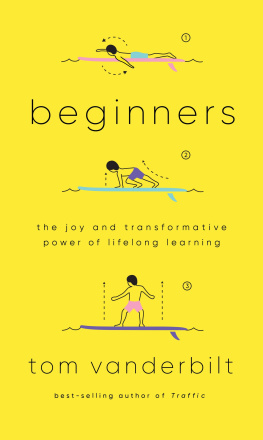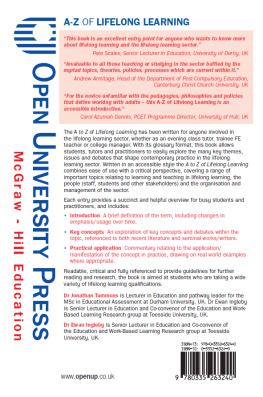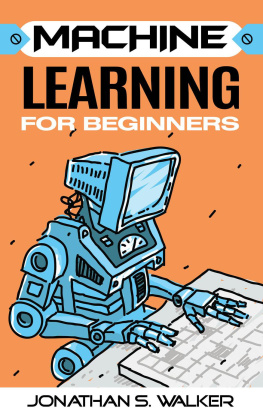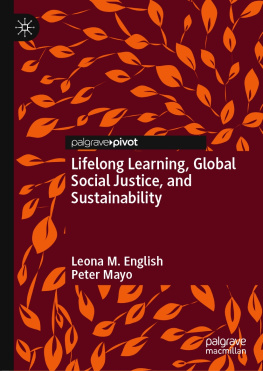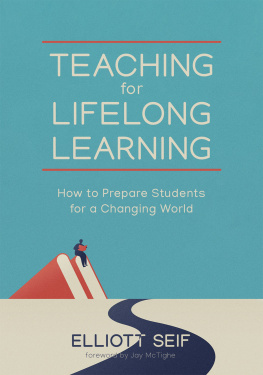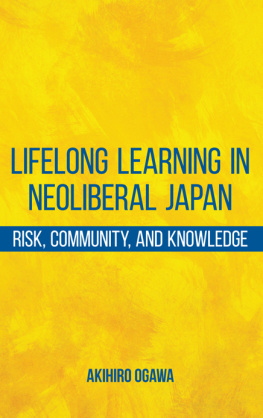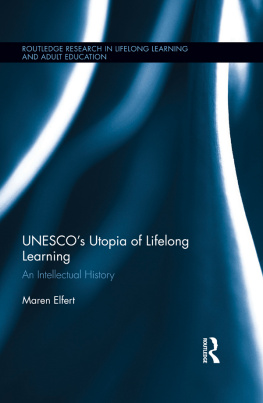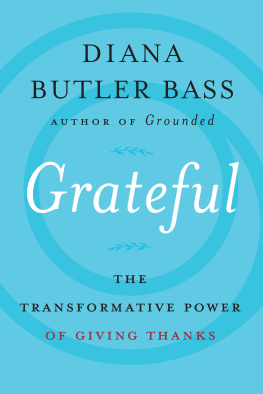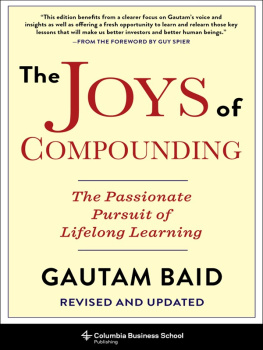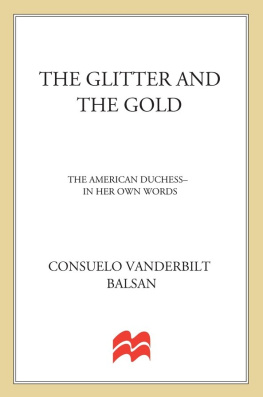Tom Vanderbilt - Beginners: The Joy and Transformative Power of Lifelong Learning
Here you can read online Tom Vanderbilt - Beginners: The Joy and Transformative Power of Lifelong Learning full text of the book (entire story) in english for free. Download pdf and epub, get meaning, cover and reviews about this ebook. year: 2021, publisher: Knopf Doubleday Publishing Group, genre: Religion. Description of the work, (preface) as well as reviews are available. Best literature library LitArk.com created for fans of good reading and offers a wide selection of genres:
Romance novel
Science fiction
Adventure
Detective
Science
History
Home and family
Prose
Art
Politics
Computer
Non-fiction
Religion
Business
Children
Humor
Choose a favorite category and find really read worthwhile books. Enjoy immersion in the world of imagination, feel the emotions of the characters or learn something new for yourself, make an fascinating discovery.
- Book:Beginners: The Joy and Transformative Power of Lifelong Learning
- Author:
- Publisher:Knopf Doubleday Publishing Group
- Genre:
- Year:2021
- Rating:5 / 5
- Favourites:Add to favourites
- Your mark:
- 100
- 1
- 2
- 3
- 4
- 5
Beginners: The Joy and Transformative Power of Lifelong Learning: summary, description and annotation
We offer to read an annotation, description, summary or preface (depends on what the author of the book "Beginners: The Joy and Transformative Power of Lifelong Learning" wrote himself). If you haven't found the necessary information about the book — write in the comments, we will try to find it.
Beginners: The Joy and Transformative Power of Lifelong Learning — read online for free the complete book (whole text) full work
Below is the text of the book, divided by pages. System saving the place of the last page read, allows you to conveniently read the book "Beginners: The Joy and Transformative Power of Lifelong Learning" online for free, without having to search again every time where you left off. Put a bookmark, and you can go to the page where you finished reading at any time.
Font size:
Interval:
Bookmark:
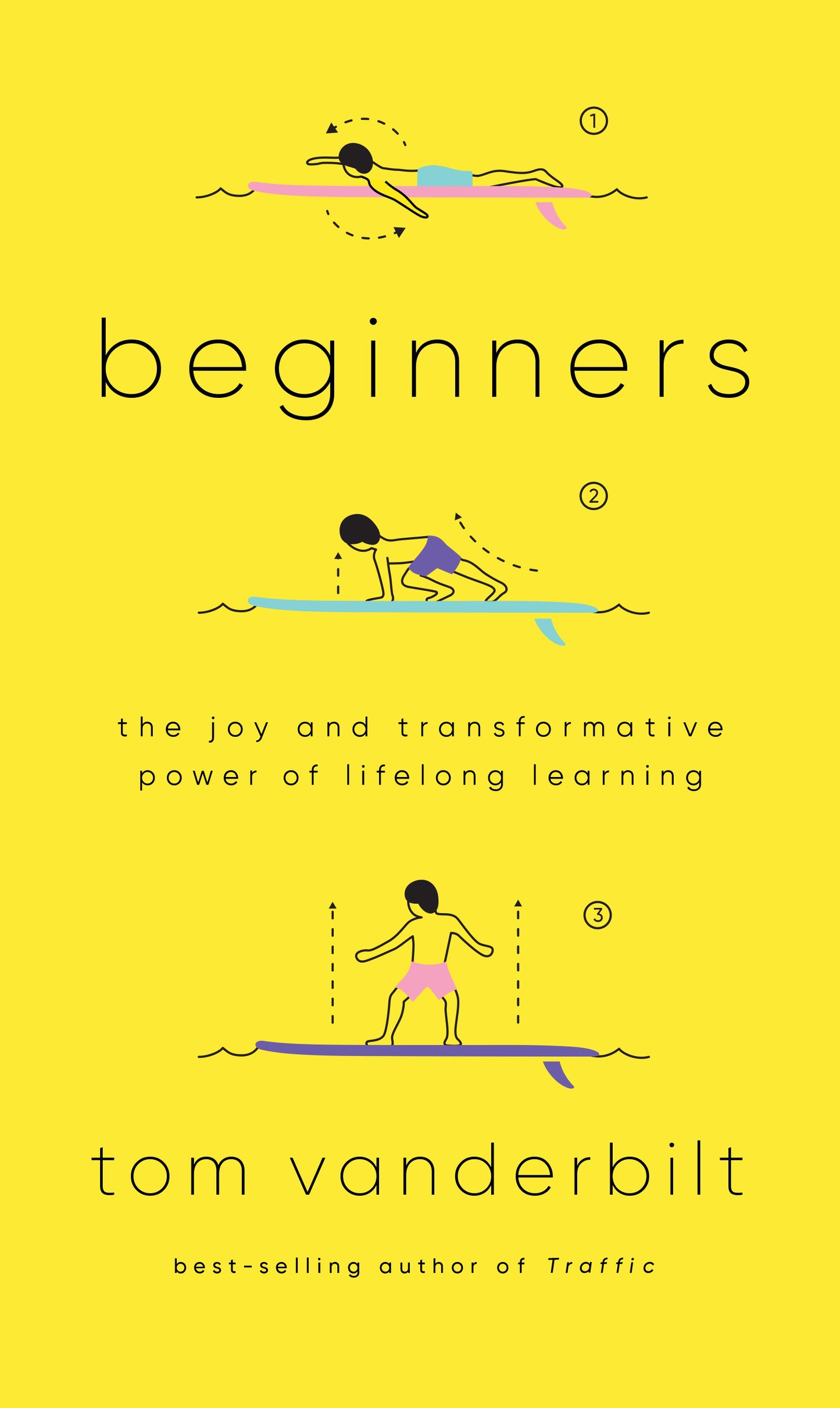
You May Also Like
Traffic
Survival City
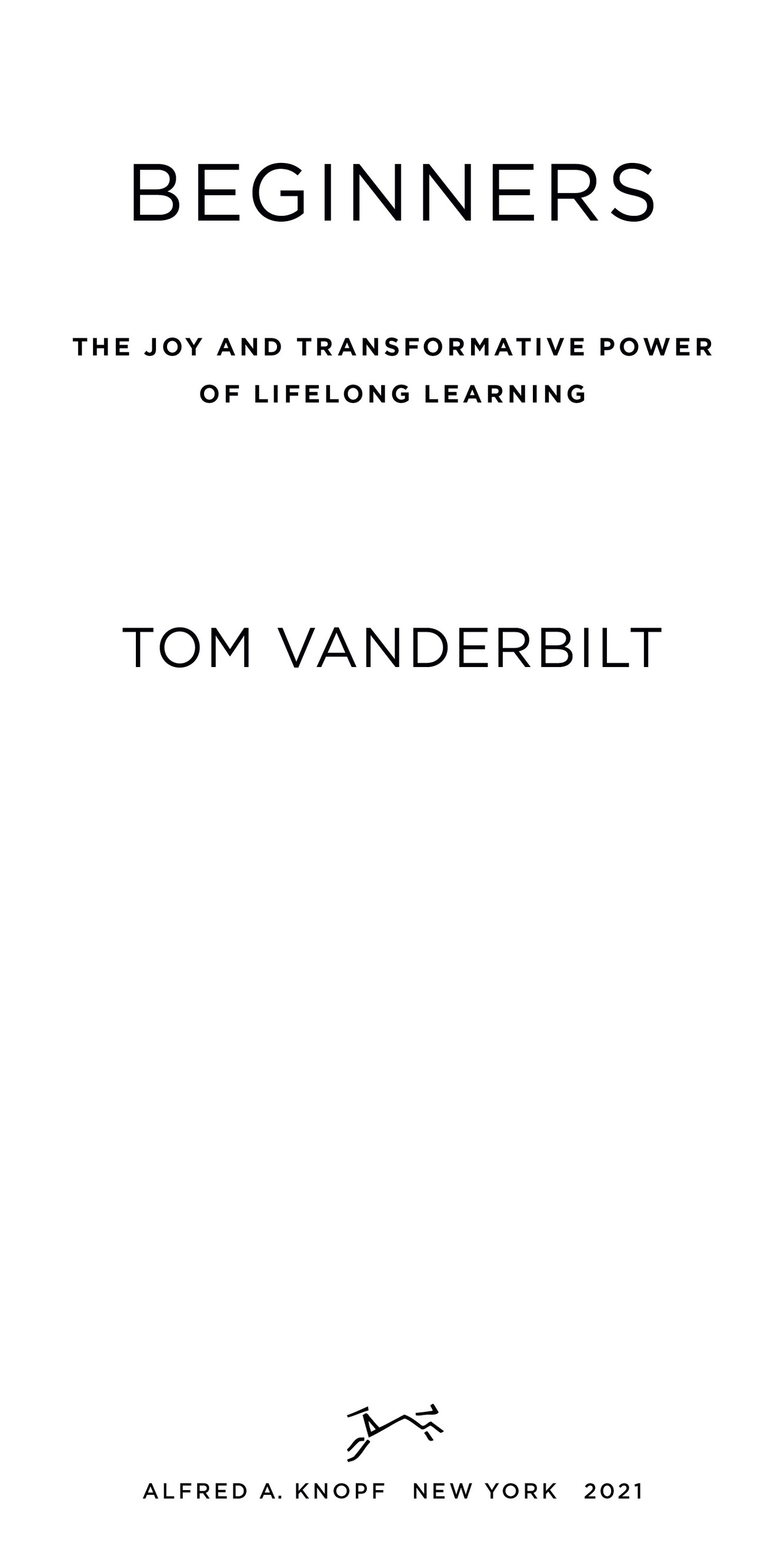
THIS IS A BORZOI BOOK
PUBLISHED BY ALFRED A. KNOPF
Copyright 2021 by Tom Vanderbilt
All rights reserved. Published in the United States by Alfred A. Knopf, a division of Penguin Random House LLC, New York, and distributed in Canada by Penguin Random House Canada Limited, Toronto.
www.aaknopf.com
Knopf, Borzoi Books, and the colophon are registered trademarks of Penguin Random House LLC.
Portions of this work previously appeared, in different form, as Learning Chess at 40 in Nautilus, Issue 36 (nautil.us) on May 5, 2016, and My Family Vacation Swimming in the Open Sea in Outside (outsideonline.com) on July 2, 2019.
Library of Congress Cataloging-in-Publication Data
Names: Vanderbilt, Tom, author.
Title: Beginners : the joy and transformative power of lifelong learning / Tom Vanderbilt.
Description: New York : Alfred A. Knopf, 2021. | Includes bibliographical references.
Identifiers: lccn 2019057320 (print) | lccn 2019057321 (ebook) | isbn 9781524732165 (hardcover) | isbn 9781524711849 (open market) | ebook ISBN 9781524732172
Subjects: lcsh : Self-actualization (Psychology) | Self-managed learning.
Classification: lcc bf 637. s 4 v 375 2020 (print) | lcc bf 637. S 4 (ebook) | ddc 646.7dc23
lc record available at https://lccn.loc.gov/2019057320
lc ebook record available at https://lccn.loc.gov/2019057321
Cover illustration and design by Tyler Comrie
ep_prh_5.6.1_c0_r0
To my father,
for picking up the piano,
and sticking with it
You must become a beginner.
rainer maria rilke
One Sunday morning in a crowded room in New York City, I sat down to a chessboard with my heartbeat elevated and my stomach on the boil.
My opponent and I shook hands, as is the custom. Apart from stating our names, which we duly jotted in our notation pads, we exchanged no words. While I set the time on the clocktwenty-five minutes for each playerhe methodically centered each piece on its square.
Nonchalantly, as if to appear faintly bored, I did the same. I tried to arrange my pieces even more symmetrically, as if seizing some minute advantage (a ploy undermined by momentary panic that Id incorrectly placed the bishop and knight). An expectant hush fell about the room as we waited for the tournament director to give the start signal.
As we sat, I tried to size my opponent up. He idly rolled a pencil between his fingers. His eyes drifted to the neighboring tables. I peered at him with what I hoped looked like remorseless pity. I was trying to project as much feral menace as one could while sitting in a library chair. I wanted to channel a feeling that had been described to me by Dylan Loeb McClain, the former chess columnist for The New York Times, when, in 1995, hed played the then world champion, Garry Kasparov, in an exhibition game.
I didnt feel like he wanted to beat me, McClain said. I felt like he wanted to reach across the board and strangle me. He intuited that Kasparov, hunched like an angry bear and channeling unbelievable psychic ferocity, would not be happy gaining some minor positional advantage, or even simply winning. Something more personal, more disturbing seemed to be driving him.
This is a common sensation in the world of chess. I like the moment when I break a mans ego, the mercurial champion Bobby Fischer once put it.
I looked again at my opponent. Could I, through tactical finesse and the withering power of my merciless gaze, slowly dismantle the core of his being?
Just then, a woman appeared at his side, bearing a small carton of chocolate milk. She kissed him on the head, said, Good luck, and flashed me an owlish smile. Ryan, my opponent, was eight years old. With admirable composure, and an occasional sniffle, he dispatched me somewhere after the thirtieth move. I congratulated him, and as I went to inform the tournament director of the result, I saw him in the hallway, ego intact, proudly relaying the news to his mother.
Ryan and I were among those gathered for a Sunday morning Rated Beginner Open at New York Citys Marshall Chess Club. Occupying several floors of a historic town house on one of Greenwich Villages most handsome blocks, the Marshall is a delightful anachronism, a relic of the days when any number of chess teams, collegiate and otherwise, battled across the region, their exploits recorded in the sports sections of newspapers.
That it exists here today, nestled amid some of the most expensive real estate in the country, is only thanks to a plot twist worthy of Dickens.
In 1931, at the height of the Depression, a group of wealthy benefactors, chess enthusiasts all, bought the building on behalf of the clubs namesake, Frank Marshall. A grandmaster and U.S. champion whod once operated an oceanfront chess emporium in Atlantic Citywhere he sometimes played passersby for moneyMarshall had for decades piloted his eponymous club through a number of iconic Manhattan locales, from Keens Chophouse to the Chelsea Hotel. The Marshall now had a home for life.
The place has lost a bit of its old-school lusterthere are no longer jacketed waiters to serve coffee or teabut playing chess at the Marshall today, you still feel youre in some Gilded Age temple to the Game of Kings. History envelops you: busts of famous grandmasters; vintage photographs of team champions; the very table that Magnus Carlsen, the current world champion, sweated over as he defended his title against Sergey Karjakin in 2016.
The Marshall is no museum, though. Entering the place on a weekend, during a big tournament, is like walking into a human-powered data center: rows and rows of processors, silently calculating, thrumming with intensity, generating heat and a persistent tang of nervous perspiration.
The Sunday Beginners tournament was strictly small stakes, for players rated under 1200, or having no rating at all. Most grandmasters have ratings above 2500; I had the newbie rating of 100.
My day had started promisingly. Against my first opponent, John, a gray-haired man with the look and quiet gravity of a scholar, Id initially fallen behind on material, as pieces are called in chess. As the game drew on, he tried to press his advantage. And yet I kept fighting, finding inventive obstacles to his victory. To each of these he would respond with a small, tired sigh. I could feel his discomfort, and with each sigh I seemed to grow in strength.
Then, with my own king nearly surrounded, I spotted the chance for a checkmate. I just needed him to not see it. There is an old expression in chess that the winner is the player who makes the next-to-last mistake. And indeed, my opponent played offense when he needed to be playing defense, moving a pawn toward what he assumed was my demise. As I slid my rook into position, trapping his king along the A file (the first vertical row on a chessboard), a slow, queasy realization spread across his face.
My next opponent, Eric, was a serviceman on leave from Afghanistan, where he spent a lot of downtime playing online chess. He knew hed be coming through New York on a visit stateside and had dedicated time for a Marshall pilgrimage. He looked a bit like the actor Woody Harrelson: buzz cut, grizzled, with a thousand-yard stare. Our match was tense and close fought, until he captured one of my rooks with a bishop pin. After I resigned, he looked relieved and said I had played much better than my rating would indicatethe first words he had uttered.
Font size:
Interval:
Bookmark:
Similar books «Beginners: The Joy and Transformative Power of Lifelong Learning»
Look at similar books to Beginners: The Joy and Transformative Power of Lifelong Learning. We have selected literature similar in name and meaning in the hope of providing readers with more options to find new, interesting, not yet read works.
Discussion, reviews of the book Beginners: The Joy and Transformative Power of Lifelong Learning and just readers' own opinions. Leave your comments, write what you think about the work, its meaning or the main characters. Specify what exactly you liked and what you didn't like, and why you think so.

